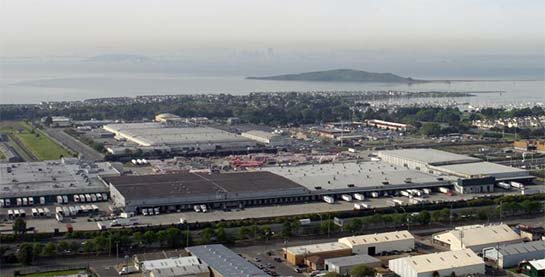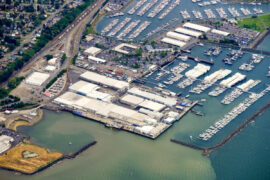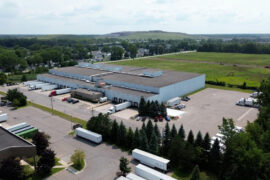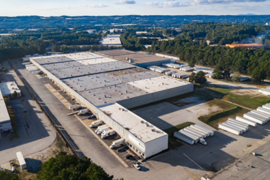Houston, Texas-based Viking Cold Solutions is working with Dreisbach Enterprises to ensure temperature stability and manage energy usage at its public refrigerated warehouse (PRW) in Richmond, California. The installation of a Viking Cold Thermal Energy Storage (TES) system promises to cut the facility’s electricity requirement by over 55 percent – from 850 kilowatts to 400 kilowatts for 11 hours each day – and reduce total electricity consumption by as much as 35 percent.
Low-temperature cold storage warehouses require the highest energy demand per cubic foot of any industrial electricity load. In some markets, peak demand charges comprise up to 70 percent of a facility’s electricity bill, prompting some operators to shut off equipment during peak periods. This “fly-wheeling” tactic can cause micro-thawing and micro-freezing, which degrades cell structure and reduces the quality and shelf life of foods. TES serves as a heat sink to manage heat infiltration, protect product, boost refrigeration efficiencies and better manage peak demand costs.
“Viking Cold Solutions’ TES systems have delivered an immediate reduction in refrigeration equipment run time, significant load reduction during peak pricing periods, and stable temperatures throughout the entire freezer,” said Jason Dreisbach, owner of Dreisbach Enterprises. “With high energy costs in California, particularly due to rising peak period demand charges, the increased refrigeration flexibility and resulting energy savings have directly improved our bottom line while ensuring we meet customers’ temperature expectations.”

The 400,000-square-foot facility in Richmond features six million cubic feet of frozen, chilled and ambient space and 13,000 fully racked pallet positions. Its TES systems consist of self-contained cells of environmentally-friendly, proprietary phase change material (PCM) paired with intelligent controls and 24/7 remote monitoring, notification and reporting software. During off-peak energy hours, a cold storage facility’s conventional refrigeration equipment freezes the PCM. During peak demand hours, operators reduce mechanical run time of their costly refrigeration systems and rely on the PCM to maintain over 35 percent more stable temperatures. Also, during these reduction periods, the PCM absorbs approximately 85 percent of all heat infiltration in the freezer to ensure food quality and safety and avoid up to 90 percent of peak period consumption.
About Dreisbach
 Dreisbach Enterprises provides a wide range of refrigerated warehousing and logistics services in the Northern California market. Its expertise includes conventional public cold storage, order pick distribution, import/export, drayage, blast freezing, IQF processing, cross-docking and trans-loading, and local and interstate trucking. Loading and unloading airfreight containers are also offered, in addition to specialized handling of temperature sensitive fresh fruits and vegetables. The family-owned and –operated company was founded in 1953 and is headquartered in Oakland, California.
Dreisbach Enterprises provides a wide range of refrigerated warehousing and logistics services in the Northern California market. Its expertise includes conventional public cold storage, order pick distribution, import/export, drayage, blast freezing, IQF processing, cross-docking and trans-loading, and local and interstate trucking. Loading and unloading airfreight containers are also offered, in addition to specialized handling of temperature sensitive fresh fruits and vegetables. The family-owned and –operated company was founded in 1953 and is headquartered in Oakland, California.





